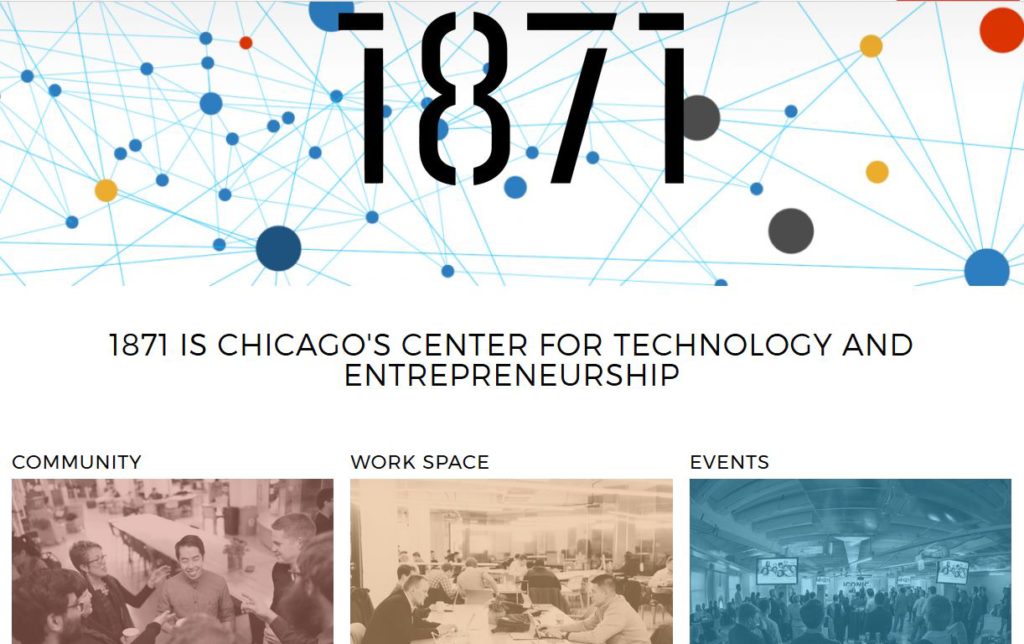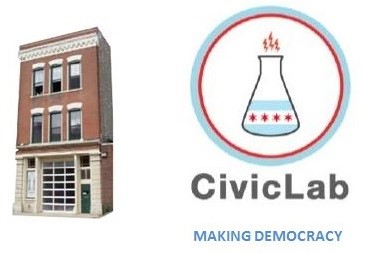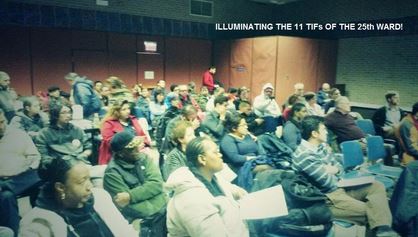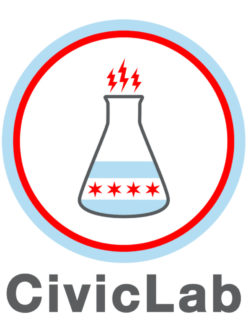
The case for supporting the CivicLab.
“Chicagoland’s civic health is on life support.”
That was the grim assessment from the 2010 report “Chicago Civic Health Index.” The report was prepared by the McCormick Foundation and the Citizen’s Advocacy Center. “The 2010 Chicago Civic Health Index demonstrates the failure of the region to prepare its youngest citizens for their adult civic responsibilities, along with the effects of endemic political corruption and the widespread cynicism and disengagement it spawns.” Ouch.
Fast forward to 2019. How are we doing?
Not so well.
- A second Illinois Governor in a row was sent to prison for corruption.
- Alderman Ed Burke became the 37th alderman to be indicted on corruption charges earlier this year.
- On February 26th the voter turnout for the municipal election was about 34%.
On a wide range of civic metrics Chicago is failing. “A Tale of Three Cities: The State of Racial Justice in Chicago” a 2017 report by the University of Illinois’ Institute for Research on Race & Public Policy is so loaded with depressing statistics and graphics on racial inequities across the city as to require therapy and bed rest upon reading.
The Loving City Index looks a wide range of well-being metrics for healthy families and young people and gives Chicago terrible marks for the way it treats working class families and communities of color. This report looks at a wide array of conditions and pronounces us as failing our Black children.
Civic engagement and social justice need a shot in the arm in Chicago. The grassroots efforts that are in place to erase inequity and boost neglected communities need help to survive and thrive.
We need to think of our social justice system here as an ecosystem and lavish upon it the same consideration, nourishment, and celebration as we do to the commercial and business ecosystem.
The shorthand way of thinking about this problem and opportunity is to look at a prominent example of infrastructure building and support system upgrade for the tech community – 1871.
1871 occupies 140,000 square feet on three floors of the Merchandise Mart. It was founded in 2012 and has received $4.8 million in state public funding to date. In 2017 the Chicagoland Entrepreneurial Center, the nonprofit that operates 1871, enjoyed revenues of $8.6 million, including $1.7 million in grants and contributions. Major corporate sponsors include AT&T, Motorola, PNC bank, and the Chicagoland Chamber of Commerce.
The former CEO, Howard Tullman, was paid $447,771. In 2017, 1871 lost $1.2 million. It now operates with a staff of 26, down from 28.

Their web site boasts – “Come to a place where you can share ideas, make mistakes, work hard, build your business and, with a little luck, change the world.”
Really?
I don’t want to knock 1871 – but how, exactly, are they going to change the world? They are about commerce. They are about technology. They are about profits. Profit certainly MOVES the world. Money undoubtedly BUYS influence and makes many things happen. But I think we call all agree that profit and resource generation in America and in Chicago has not and is not being equitably distributed and is not changing the world.
Some people in Chicago have grown enormously wealthy. Many, many people are poor and are stuck in disinvested communities. Our middle class has shrunk dramatically since 1970. “We have two cities,” said Prof. Janet Smith, director of the University of Illinois Chicago Voorhees Center for Neighborhood and Community Improvement. “We have the rich and we have the poor.”
Chicago has always been proud of their business pioneers and moguls – from Marshall Field to Cyrus McCormick to Julius Rosenwald to the Pritzker clan. And so, it makes sense for 1871 to gobble up resources, public love, and media attention as it stakes its expensive claim to being the home of Chicago’s commercial innovation and tool building.
But Chicago has also been the home of social justice and civic innovators. People like Ida B. Wells. Jane Addams. Saul Alinsky. Heather Booth. Gale Cincotta. Rudy Lozano.
These leaders created products and programs that challenged injustice, promoted democracy, and directly involved tens of thousands of people in bettering their own lives – helping them to demand changes to racist, unjust, and just plain cruel practices from local government and local business.
That DOES sound like changing the world!
Where is the 1871 that celebrates THOSE leaders and that lifts up their ideals, goals, and practices?
Chicago needs a home for social justice and civic engagement to advance our civic ecosystem in the same way and at the same scale as 1871 does for the commercial tech sector.
Social justice needs a powerful home in Chicago.

for two years
The work of justice and equity needs a lab — a place for tool building, basic research and knowledge sharing, for training and leadership development, for fellowship, and for experimentation.
In 2017 the CivicLab opened the POWER Institute (People Organizing to Win, Engage & Resist – www.powerinstitute.us) to offer pedagogy and skill building for people who want to fight for justice in Chicago and lead in public life. We offer two-hour open enrollment workshops – “Chicago 101 – How Did Our Civics Get So Toxic,” “Community Organizing 101 – How Do the Powerless Get Power?,” “Grassroots Campaigning 101 – How To Win For Justice,” and “TIF 101 – Organizing for Economic Justice.” We’ve trained 180 people across 20 sessions.
Ten people who subsequently ran for office took our training workshops.

Since the CivicLab opened its doors in the West Loop, it has directly touched over 10,000 people.
Over 200,000 people have viewed our presentations on SlideShare (https://www.slideshare.net/tomtee)! And although the major local media have stayed away, we have had over 100 stories published on our work in the national and hyper-local neighborhood media.
Our work has had a powerful impact on Chicago’s civic eco-system. Every progressive candidate for local office is now critical of TIFs and many have bold plans for reforming – or even abolishing – them.
We believe we have materially contributed to a sense of renewed civic possibility here. Neighbors, and the candidates who seek their votes, no longer routinely accept the narrative that Chicago is out of ideas for fixing our fractured city so that it works for ALL.

We’ve done all of this with virtually no resources. We look forward to a day when this sort of work will be abundantly supported.
What is needed to get justice a home in Chicago as we are imagining it?
First – send a wake-up call to well-endowed change funders and foundations demanding that they re-think how to do justice; stop funding comfortable groups that do not challenge power; stop lavishing funds on out-of-town groups that do not know our city and are brought here for one-off efforts that leave with little to show for their work once they leave.
In 2016 the Chicago Community Trust spent $350,000 to bring Social Labs, which is a project of Roller Strategies, a design and consulting service located in England, to Chicago. That money paid for a two-day workshop involving some 60 community residents and eventually awarded $1,000 to 36 participants.
What was the return on investment to the stakeholders and contributors to the Chicago Community Trust from the $350,000 spent on Roller Strategies? We find no results or outcomes from that piece of work. I suppose, on the plus side, they left $36,000 in the pockets of Chicago residents.
The CivicLab has directly engaged over 8,000 people via 130+ community meetings – where we answered the call FROM the community. The results of THOSE meetings are still rippling across our civic ecosystem. Here are a few concrete examples:
- Ten people who took our training have run for office
- Our TIF research has been used by the Chicago Teachers Union, RAISE Your Hand Illinois, The Chicago Lawyers Committee for Civil Rights, the Better Government Association, and many other groups
- Virtually every candidate in the 2019 municipal election was forced to take a critical position on TIFs because their constituents demanded it
- Throughout the 2019 campaign, issues featured in “Chicago Is Not Broke” were raised for discussion in all public candidate debates and forums
- One candidate for mayor and one for treasurer ran on the promise of delivering a public bank to Chicago – an idea featured in the book and discussed in the 65 public meetings.
Our story is not unique. The Little Village Environmental Justice Organization, the Kenwood Oakland Community Organization, the No Cop Academy Coalition, the Chicago Alliance Against Racist and Political Repression, the Uptown People’s Law Center, and the Southeast Environmental Task Force are all seasoned and impactful organizations doing powerful work with limited resources.
We need to build power for justice with strong roots IN OUR COMMUNITIES. We need to recognize and celebrate our grassroots warriors and support work on the edges – work that challenges entrenched power and corrupt special interests.
Second – we need some visionary deep pockets to invest in infrastructure – just as the business community has done. We need patient money willing to build lasting instruments and to invest in proven champions of justice and change. In 2017 there were 4,840 co-working and maker spaces across the USA. There are about 1,400 business incubators across the country, but virtually no spaces devoted to building civic muscle. We need CivicLabs in every community across the USA!
Major Foundations – get OUT of the downtown high-rent palaces and build new homes for social change IN our communities. Do it quickly. Spend significant money in our communities and spend more of your money. The IRS allows foundations to exist when they give away tiny fractions of their wealth; this should change. Go big or get out of the social change business. Rome is burning while you continue to fiddle.
Third – Build a more collaborative and supporting mindset inside our own work. The philanthropy and downtown civic groups often play one grassroots organization against another; deal with them from a perspective of “don’t have,” and dole out crumbs as if it were a feast.
We need to expand our collective civic imaginations and move from a civic narrative of scarcity to one of generosity, abundance, and possibility. And we need to grow a network of CivicLabs to be civic workshops and gyms that build the tools and muscles to enable that change.
Chicago needs a robust home for justice.
The CivicLab can be that place.
Tom Tresser
Co-founder, President of the CivicLab
March 13, 2019
Testimony from CivicLab users:
http://tinyurl.com/TIF-Organizers-Talk – Short videos from neighbors who organized TIF town meetings in their communities.
https://tinyurl.com/Harambee-Testimonials – A short video containing testimonials from attendees from our second Civic Harambee (Swahili for “Let’s all pull together” from August 2019)
Testimony from POWER Institute attendees – http://powerinstitute.us
References:
“Chicago Civic Health 2010” – https://www.google.com/url?sa=t&rct=j&q=&esrc=s&source=web&cd=3&ved=2ahUKEwiJ2tLvgP3gAhVI8IMKHeBmDLMQFjACegQIAxAC&url=http%3A%2F%2Fdocuments.mccormickfoundation.org%2Fpublications%2Fspecialreports%2Fchicago-civhealth.pdf&usg=AOvVaw23DgYi611Cggg4laemdmzy
Chicago Board of Elections – https://chicagoelections.com/en/election-results-specifics.asp
“A Tale of Three Cities: The State of Racial Justice in Chicago” 2017 – http://stateofracialjusticechicago.com
“Chicago Loving City Index” Summary – https://lovingcities.schottfoundation.org/wp-content/uploads/2018/01/loving-cities-chicago.pdf
“Is 1871 becoming too big?” – Crain’s Chicago Business, 5/21/15 – https://www.chicagobusiness.com/article/20150521/BLOGS11/150529970/tech-incubator-1871-s-planned-expansion-in-chicago-alarms-some-private-sector-co-working-spaces
“1871’s revenue grew with expansion, as did costs” – Crain’s Chicago Business, 3/1/19 – https://www.chicagobusiness.com/john-pletz-technology/1871s-revenue-grew-expansion-did-costs
Data on the Chicago Entrepreneurial Center retrieved from GuideStar – https://www.guidestar.org/profile/20-8411320
“The Middle Class Is Shrinking Everywhere – In Chicago It’s Almost Gone” – WBEZ-FM, 2/18/19 – https://www.wbez.org/shows/wbez-news/the-middle-class-is-shrinking-everywhere-in-chicago-its-almost-gone/e63cb407-5d1e-41b1-9124-a717d4fb1b0b
Social Labs – https://social-labs.org – This group no longer seems to be operating. Roller Strategies – https://www.roller.sg seems to be based (or their URL is) in Singapore.
Little Village Environmental Justice Organization (LVEJO) – http://www.lvejo.org
Kenwood Oakland Community Organization – http://kocoonline.org
No Cop Academy Coalition – https://nocopacademy.com
Chicago Alliance Against Racist and Political Repression – https://www.caarpr.org
The People’s Law Center – https://www.uplcchicago.org
Southeast Environmental Task Force – http://setaskforce.org

